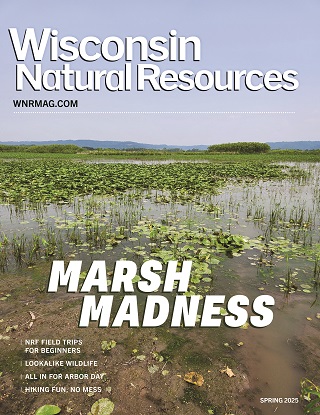Tommy White: Dean of urban angling
Bait shop owner is a fixture in the Milwaukee fishing community and gets the most from giving back
IN THIS ISSUE: Expanded fishing coverage
- It's reel time
- On fishing and outdoor experiences
- Tommy White: Dean of urban angling
- Wonderful marriage of science and art
- Gear up to go fish [PDF]
- Game fish of Wisconsin poster [PDF]
Story and photos by Joshua Morris
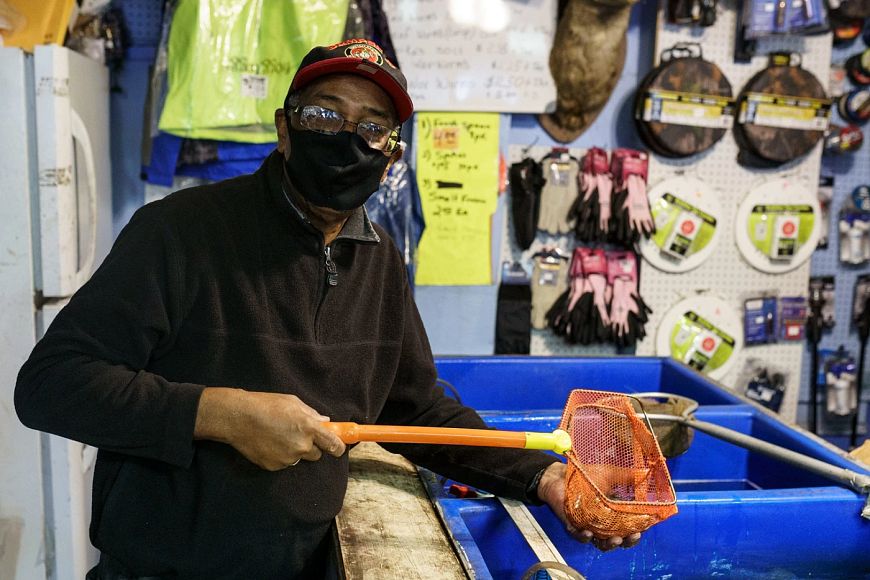 Tommy White, owner of A&C Bait Shop on East Center Street in Milwaukee.
Tommy White, owner of A&C Bait Shop on East Center Street in Milwaukee.In Milwaukee’s inner city, Tommy White sits in the bait shop his parents established in 1968, waiting to open for the day.
In these serene moments, he reflects on the hard work it took for his family not only to migrate north from Mississippi but to have multiple businesses start and fail. A&C Live Bait is the actualization of a dream built from years of sacrifice — and its legacy has endured the test of time.
White’s southern roots give him a sense of pride and perspective, but his background also reminds him of the perseverance needed to run one of the longest-standing bait shops in the Midwest.
White’s grandfather was very likely the first freed slave in his family. His parents, Acie and Carrie White, were sharecroppers who moved to Wisconsin to forge a new path.
White and his three siblings at the time moved to Milwaukee at young ages. Nine more siblings were all born and raised in Milwaukee.
“When we got here, we moved around a lot,” White said. “One of the first places I can remember is when we lived off of 6th, right off of Walnut.”
REELS OF SUCCESS
Although the family was far from Kosciusko, Mississippi, they brought the work ethic that would soon fuel many business endeavors. The first was a Tastee-Freez, selling fast food and soft serve ice cream.
“What made them think they could buy a Tastee-Freez on the south side of Milwaukee, I haven’t the faintest idea,” White said. “This was even before Father Groppi integrated the south side.”
During the mid-1960s, the Catholic priest joined with local Black leaders such as attorney Lloyd Barbee and councilwoman Vel Phillips to organize and march for civil rights in the city.
“You know at one point, Blacks weren’t allowed to go to the south side, let alone live or own a business there,” White recalled.
After the Whites’ Tastee-Freez venture ended, next came a religious record shop, a candy store and a fish market, where the family cooked and sold fish. At age 21, fresh off a stint in Vietnam with the U.S. Marine Corps, White found himself skinning, weighing and preparing fish for customers.
“Some of our customers wanted freshly cooked fish, so I would run out the back door, down the alley and hand it to my mother to cook,” White said. “My mother would cook it up, and we would bring it back.”
This system worked well until a customer and friend of the family pointed out they would go to jail unless they had a cook permit. With a slight redirection, the White family shifted from cooking fish to selling bait.
“We liked to fish, and so my father would load us up, and we would travel primarily to Palmyra and Oshkosh,” White said. “This was before the expressway was built. We would travel down to Highway 18 through Delafield, and that’s how we got into this business.”
CONNECTING TO THE COMMUNITY
The family started collecting nightcrawlers, red worms, bobbers and weights. They found local suppliers, most of which aren’t in business anymore.
While growing the bait shop, White’s father expanded its reach in the Milwaukee area by selling bait out of his van. He hired many workers from inside the local community.
“If it weren’t for the community, we wouldn’t exist,” White said. “In the early days, A&C was probably the first employer for many young folks — and adults, too.”
For more than 50 years, A&C Live Bait has served the Milwaukee fishing community. White has worked with a diverse clientele, no small feat considering his shop sits in what is widely considered the most segregated city in America.
White said he has never been affected by his skin color as a business owner and Black man, and he runs his shop that way. When it comes to A&C, race, politics and religion all come after fishing, a philosophy that has drawn customers from as far as Europe to shop before hitting the Milwaukee area waters.
“When you come into this store, we talk fish,” White said. “I’ve run this store for so long because of the people. You meet some great people in this business.
“Hopefully, the experience we give our customers, the way we greet them and the way we get along is as valuable to them as it is to us.”
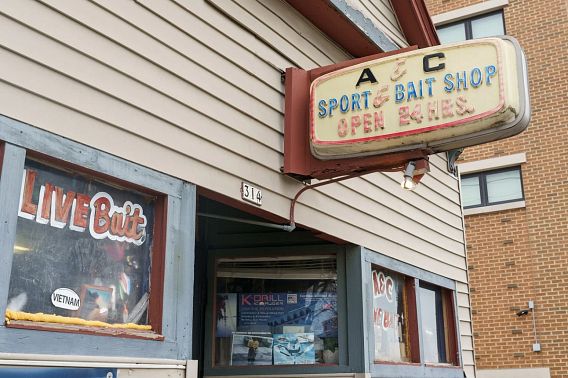 Tommy White's A&C Bait Shop has been a fixture in Milwaukee for decades.
Tommy White's A&C Bait Shop has been a fixture in Milwaukee for decades.FISHING ONLY GETS BETTER
Much of A&C’s customer base has remained loyal through the shop’s many years in business. Not much has changed in that regard. Customers have walked through A&C’s doors on Milwaukee’s East Center Street for over five decades.
One thing that has changed is the fishing scene. White remembers growing up on Lake Michigan, where the only thing anglers would fish for was lake perch, and the bag limit was more than 30, as opposed to the current limit of 25.
He remembers not wanting to go fishing because of the putrid stench of the alewife fish that washed up on the shore — another thing a modern Milwaukeean has never experienced.
“I guess you could say I was there in its infancy,” White said of the city’s fishing scene. “We watched it go from lake perch to salmon and trout to today it being salmon, trout, burbot and lake perch.”
In White’s opinion, the work done on the city’s Lake Michigan shores since he was a youth has contributed to a resurgence of interest in things like fishing.
“We have a lot of young college students that come in from all over the country, and they’re surprised at what we have here, you know, because some of them have never caught trout and salmon before,” White said. “We’ve watched it grow, and we couldn’t have supported ourselves without it.”
RISING TO THE OCCASION
The community’s support has kept A&C going through the good times, the not-so-good times and the unpredictable times — like today. As with many small businesses, A&C has not been immune to the challenges of COVID-19.
While the company has taken a hit from the pandemic, White also has felt the effects personally. He has suffered the loss of three family members due to the disease.
In White’s eyes, though, the idea of shutting down A&C was complicated. Bills needed to be paid, certainly, but there also was his sense of duty to the fishing community he’s helped sustain over the last half-century.
For his wife, the concern was that if White became sick, he wouldn’t be able to do either. So the two came to a compromise.
“We made an agreement,” White said. “She said, fine, you’re going to keep this store open. Here are the two things you need to do. When you come home, you need to get out of your shoes, clothes, take a shower and change into something else.
“The second thing is, you’ve got to sleep on the couch.”
In addition, White promised not to have more than two or three people in his store at one time. After a 30-day probationary period, White was granted access to the bedroom again.
The challenges of COVID-19 have surely taken a toll, but the White family is no stranger to adversity. What keeps White going may be the strength passed down from his mother and father; perhaps it’s the deep desire to serve the community, or maybe it’s both.
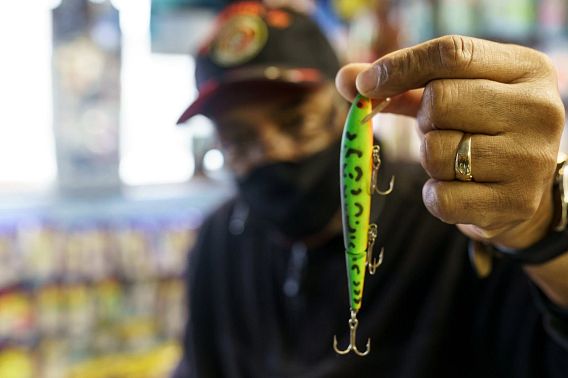 A&C Bait Shop has everything to outfit a fishing excursion and can accommodate any budget.
A&C Bait Shop has everything to outfit a fishing excursion and can accommodate any budget.E.B. GARNER FISHING CLUB
These days, White can’t think much about going fishing for himself. How could he?
“If I go fishing, then you can’t go fishing,” White said. “When my father took care of this business, he was open 365 days a year and 24 hours a day. This is what he lived and breathed, A&C.
“My father literally moved out of the house to this store and lived in the back to run this business. When we wanted to see my dad, we had to come to the store and, often, that resulted in us working.”
One thing is for sure: The work ethic and sense of community service his father instilled in him live on in White, who continues to share his passion for fishing with the next generation. For about 24 years, A&C has co-sponsored the E.B. Garner Fishing Club in Milwaukee.
Every year on the first Saturday in June, the club hosts a youth fishing event to invite children and their families to fish. Catered food is provided, and club members instruct clinics to teach kids how to fish. More than 400 people have been in attendance at past events.
These events are reserved for the first Saturday in June because that’s when the DNR offers Free Fishing Weekend. It’s free to fish without a license.
The hope for White and other club members is that the families have enough fun on this day to be hooked.
“We host this event over at Washington Park,” White said. “We’ve had many partners like Urban Ecology (Center) and the Wisconsin Department of Natural Resources. We provide all the meals. We provide tackle, reels and rods — and all of this is free of charge.”
Sadly, the founder of the fishing club, E.B. Garner, died early last year. But White and others have no intention of letting these events come to an end.
“We will be doing something in honor of E.B. once things get back to normal because he did such a great thing here in Milwaukee for our community,” White said.
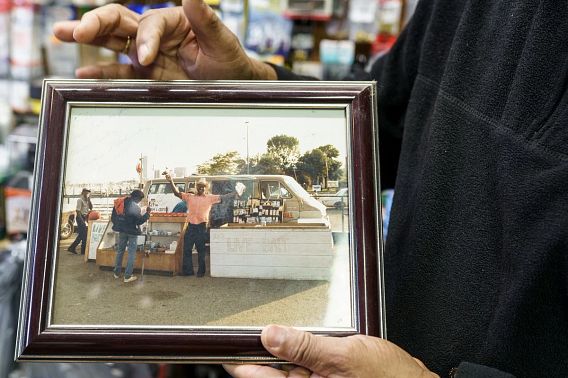 Tommy White holds a photo of his father, Acie, who started A&C Bait Shop 50 years ago.
Tommy White holds a photo of his father, Acie, who started A&C Bait Shop 50 years ago.SOUTHERN ROOTS FUEL HIS PASSION
The chance to try fishing has benefited so many youth who otherwise might not have had the resources. Often, children living in Milwaukee’s Black community aren’t even aware of their access to fishing, White noted.
For those who haven’t grasped the fishing culture, he added, it isn’t because of a lack of interest or ability, it’s more about the dearth of opportunity.
“With our younger kids, if they don’t get the chance to fish, the odds are they don’t see it as something fun or exciting to do,” White said.
For White, growing up in the South, it was different. Southern roots and fishing have a deeper tie than many realize — fishing isn’t just a recreational activity, but a way of life.
White recalled stories of his father and grandfather noodling for catfish in a tree trunk. For those unacquainted with noodling, it’s essentially fishing with one’s bare hands.
Noodling in a tree trunk is especially exhilarating, White said, because you could just as soon be pulling out a water moccasin instead of a fish on any given day.
The memories of fishing White holds most dear came from times his father took him out to fish. He also remembers his father taking him on other outdoor adventures, but fishing was the activity that stuck.
“That was just a part of the culture when we lived out in the South,” he said. “And all of my customers that come from the South always return home to fish.
“I just think it’s our job at A&C to show people, especially younger kids, that there are other things to do besides playing with video games.”
CHANGING TIDE IN MKE
In Milwaukee, A&C’s location is unique because it’s in an urban area. White understands that may create challenges, but he said it’s important to realize people in cities might like to fish just as much as folks in rural areas.
“When you get out in the rural areas, hunting and fishing is a part of their culture,” he said. “They even teach fishing in their summer schools. I’ve talked to administrators in Milwaukee Public Schools to figure out why we don’t do the same as those schools up north.”
White said he believes fishing can do so much for families, as it has for his.
“It’s kept my family together as one, and I’m sure it would keep a lot of other families together as well,” he said.
White considers teaching a new generation about fishing to be an urgent matter because interest will only dwindle as people get older.
“If these younger folks aren’t shown this as they’re growing up, they would have to get used to it as adults,” White explained. “By the time they get to being adults, there’s too many distractions for them to get into it.”
More than ever, those in and near Milwaukee have the opportunity to fish in water that’s been greatly restored from previous high levels of industrial waste.
The DNR has consciously promoted fishing in urban areas like Milwaukee County through restoration efforts and partnerships with local organizations such as the E.B. Garner Fishing Club and federal agencies like the Environmental Protection Agency.
Other initiatives to spur interest in urban fishing include new harbor maps highlighting fish species in Milwaukee’s lower estuary. Opportunities to fish in Milwaukee are increasing at a rapid rate.
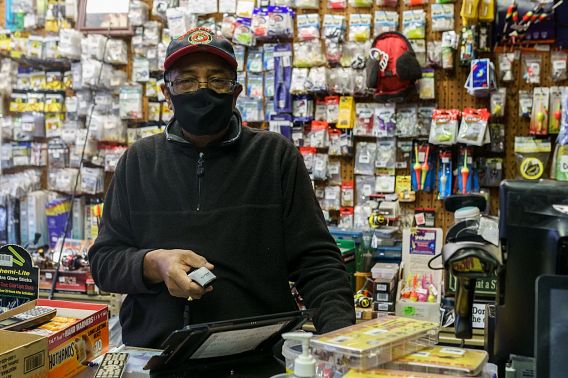 Tommy White welcomes customers to A&C Bait Shop, where fishing is foremost in conversation.
Tommy White welcomes customers to A&C Bait Shop, where fishing is foremost in conversation.EXPERT ADVICE
For those worried they lack the experience needed to go fishing, White has words of wisdom.
“In this business, there is definitely a little technique involved, but there’s a whole lot of luck,” he said.
Plus, there’s so much more to fishing than just landing the next big prize, he added.
“It’s not always about catching the fish. When you’re out there, whether you get lucky or not, you’re mesmerized.”
For aspiring anglers, it doesn’t take much to get started. For those 15 years or younger, it’s free to fish, and the cost for a license could be as low as $5 for first-time anglers no matter what their age.
As for equipment, White said about $26 should get you everything you need to get going. “We try to accommodate any budget.”
Fishing has many benefits, he added. From a practical standpoint, it offers people a way to get food from their environment’s natural resources, which may be especially useful during times like COVID-19.
“It allows them to get out, catch some fish to feed their family and live to fight another day,” he said.
And as for the health benefits, White has something to say about that, too.
“First off, being out on the water is extremely relaxing,” White said. “You forget about everything else, and all you’re doing is trying to catch the fish.
“Once that fish is on your line and you feel the vibrations coming through your rod, nothing compares. I believe it’s something that can’t be described. It must be felt."
Joshua Morris is a public information officer in the DNR’s Office of Communications.

